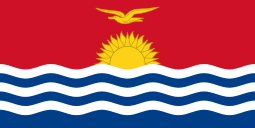Onotoa

Onotoa is an atoll and district of Kiribati. It is situated in the Gilbert Islands in the Pacific Ocean, 65 km (40 mi) from Tamana, the smallest island in the Gilberts. The population of Onotoa in the 2010 census was 1,519.[1]
The atoll is similar to many other atolls in the Gilbert Islands with its continuous line of islets and islands on the eastern side. The western side consists of a submerged reef which surrounds the islet filled lagoon.[1]
Geography
Onotoa is a low lying atoll with a land area of 15.62 square kilometres (6.03 sq mi). It has 7 villages with Tabuarorae, an islet, located at the southernmost end of the island followed by Aiaki, Otoae, Temao, Buariki, Tanaeang and Tekawa at the northernmost end of the island. The villages are located along the lagoon coastal area throughout the island. The combined islets of Otoae and Aiaki are now easily accessible after construction of a causeway from Temao to Aiaki. Tabuarorae is still not connected to the rest of the mainland.[1]
Facilities are spread right across the island, with the airport close to the northernmost village of Tekawa, the boat channel and wharf at the southern islet of Tabuarorae, the Junior Secondary School located between Otowae and Aiaki, and the main Council offices located between Temao and Buariki.[1]
Environmental issues
The construction of causeways have also resulted to significant reduction in the flushing of the lagoon that has resulted in low levels of oxygen in the lagoon, which has resulted in a lowering in the water quality.[2] The erosion and accretion that are occurring along the shoreline is identified as being linked to aggregate mining, land reclamation and the construction of causeways that has been thought to change the currents along the shoreline.[2]
Myths and legends
The name Onotoa means 'six giants'. The legend is told that a hunchback woman from Tarawa, living in a village of Nuatabu, had six sons who made fun of her deformity. She ran away to Onotoa. The sons followed her and build her a home by piling up huge coral boulders - the remnants of which can be seen today.[2][Note 1]
History
Captain Clark of the British whaling ship John Palmer was the first European to sight Onotoa in 1816, followed by Captain Chase of the American whaling ship, Japan.[2]
Onotoa Post Office opened around 1912.[5]
Notes
- ↑ Sir Arthur Grimble, cadet administrative officer in the Gilberts from 1914 and resident commissioner of the Gilbert and Ellice Islands colony from 1926, recorded the myths and oral traditions of the Kiribati people. He wrote the best-sellers A Pattern of Islands (London, John Murray 1952,[3] and Return to the Islands (1957), which was republished by Eland, London in 2011, ISBN 978-1-906011-45-1. He also wrote Tungaru Traditions: writings on the atoll culture of the Gilbert Islands, University of Hawaii Press, Honolulu, 1989, ISBN 0-8248-1217-4.[4]
References
- 1 2 3 4 "16. Onotoa" (PDF). Office of Te Beretitent - Republic of Kiribati Island Report Series. 2012. Retrieved 28 April 2015.
- 1 2 3 4 Dr Temakei Tebano & others (April 2008). "Island/atoll climate change profiles - Onotoa Atoll". Office of Te Beretitent - Republic of Kiribati Island Report Series (for KAP II (Phase 2). Archived from the original on November 6, 2011. Retrieved 28 April 2015.
- ↑ Grimble, Arthur (1981). A Pattern of Islands. Penguin Travel Library. Penguin Books. ISBN 0-14-009517-9.
- ↑ Grimble, Arthur (1989). Tungaru traditions: writings on the atoll culture of the Gilbert Islands. Penguin Travel Library. University of Hawaii Press. ISBN 978-0-8248-1217-1.
- ↑ Premier Postal History. "Post Office List". Premier Postal Auctions. Retrieved 5 July 2013.
- Exhibit: The Alfred Agate Collection: The United States Exploring Expedition, 1838-1842 from the Navy Art Gallery
Coordinates: 1°51′S 175°33′E / 1.850°S 175.550°E
